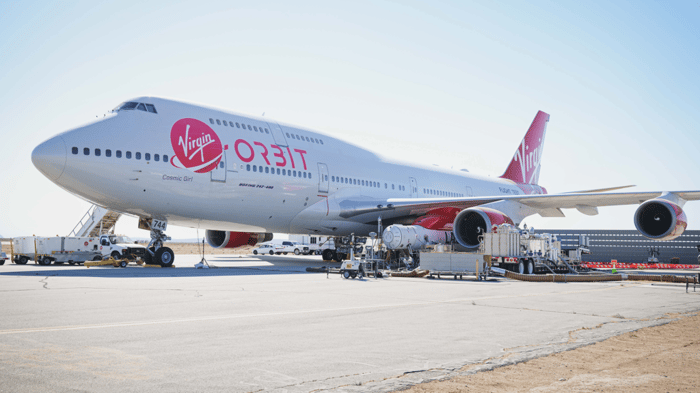With a $6.4 billion market capitalization and shares that, despite some ups and downs, are worth 125% more today than at their 2019 IPO, space tourism company Virgin Galactic (SPCE -0.71%) is undoubtedly the best known of the new space companies that have come to market of late. But Virgin Galactic isn't the only space company named "Virgin" that you can invest in.
A little over a month ago, Virgin Galactic's sister company, Virgin Orbit (which launches satellites rather than humans to space) announced that it, too, plans to go public in a SPAC-sponsored IPO. By reverse merging into special purpose acquisition company (SPAC) NextGen Acquisition II (NGCA), Virgin Orbit will go public with $483 million in cash, a $3.2 billion enterprise value, and backing from institutional investors, including aerospace giant Boeing (BA 1.76%).
But should you buy into this SPAC IPO?

Image source: Virgin Orbit.
What Virgin Orbit does
Like its sister company Virgin Galactic, Virgin Orbit takes a hybrid approach to space launch, loading a two-stage LauncherOne rocket onto a modified 747-400 aircraft named "Cosmic Girl," flying the airplane to 35,000 feet above sea level, and then releasing the rocket to blast itself -- and its payload -- the rest of the way into orbit.
This unusual path to orbit frees Virgin Orbit (and its customers) from the need to launch from a fixed spaceport, and permits the company to "launch responsively from any location around the world" that has an airport to start from. Theoretically, a customer shouldn't even have to deliver its satellite to Virgin Orbit for launch. The plane could carry a rocket to the customer's closest airport for payload integration. Later, once it's ready to launch, the plane could return, pick up the rocket, fly it to altitude, and launch.
Although Virgin Orbit isn't unique in this regard -- Northrop Grumman uses a similar approach to launch its Pegasus rockets, and Cerberus-owned Stratolaunch is also working on air-launched rockets -- Virgin Orbit does appear to now be the most active air-launch provider. It's launched two rockets already this year, has a third launch planned before the end of the year, and anticipates doubling its launch cadence in 2022, then again in 2023. Thus, it would appear the company has something of a moat around its business.
What Virgin Orbit stock costs
But are an airplane, a not-quite-unique rocket, and a business plan "moat" reasons enough to buy Virgin Orbit stock when NextGen Acquisition II brings it public later this year? Is this stock -- not to put too fine a point on it -- a bargain? Let's take a look at the company's S-4 filing with the SEC to find out.
According to this filing, Virgin Orbit is not yet profitable, having lost about $76.9 million in the first half of 2021 on $7.2 million in revenue. On the plus side, that revenue grew almost five-fold in comparison to H1 2020, and Virgin Orbit's losses slimmed by 20%.
Granted, any level of losses isn't ideal. But total liabilities at the company are less than $75 million, and Virgin Orbit's $483 million post-IPO cash hoard should suffice to keep it afloat for a few years at least as it ramps up its launches and gains scale. If one assumes that Virgin's cash reserves can hold out through at least 2023 -- well, then by that time the company should be launching 12 times per year. At an estimated $12 million fee per launch, that works out to $144 million in annual revenue.
The problem with investing in Virgin Orbit
Now here's the problem: Virgin Orbit's cost of operations is likely to rise significantly with the pace of launches, because it costs money to build, fuel, and launch rockets. But even if costs didn't rise, $144 million in revenue wouldn't be enough to cover even the company's current rate of operating costs and expenses, which appears to be about $172 million per year.
This means that Virgin Orbit will probably still be losing money even two or three years from now, at the same time Virgin Orbit's cash reserves begin to run dry.
For this reason, I think that investors have to assume that the 376.5 million total diluted share count that Virgin Orbit projects for IPO Day will not be the final share count for this company. Unless Virgin Orbit raises prices significantly, or begins launching rockets even faster than it says it wants to, the company will no sooner go public than it will need to start thinking about issuing even more shares, and diluting all the folks who helped it to go public in the first place.
To me, that just doesn't sound like a compelling "buy" thesis.
